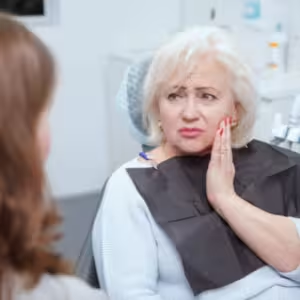As we age, maintaining good oral health becomes increasingly important to ensure a comfortable and healthy quality of life. Dental emergencies can be particularly challenging for older adults, often requiring immediate attention and potentially leading to complications if not managed promptly. Dr. Ninh at Dental 32 in Ashburn, VA, understands the significance of preventive care in minimizing the risk of dental emergencies among older adults. In this blog post, we’ll explore effective tips and strategies to help seniors maintain optimal oral health and reduce the likelihood of dental emergencies.
Importance of Preventing Dental Emergencies
Dental emergencies such as severe toothaches, broken dentures, or infections can significantly impact an older adult’s well-being. These emergencies may lead to pain, difficulty eating, and even affect overall health if left untreated. By adopting preventive measures, seniors can mitigate these risks and enjoy better oral health outcomes.
Tips for Preventing Dental Emergencies
Regular Dental Check-ups:
- Importance: Routine dental visits are crucial for early detection of potential issues and proactive management.
- Frequency: Follow Dr. Ninh’s recommendation for check-ups every six months or as advised based on individual oral health needs.
- Benefits: Early intervention can prevent minor problems from escalating into dental emergencies.
Maintain Oral Hygiene:
- Brushing: Encourage seniors to brush their teeth at least twice daily using fluoride toothpaste and a soft-bristled brush.
- Flossing: Stress the importance of daily flossing to remove plaque and food particles from between teeth and along the gumline.
- Use of Mouthwash: Incorporate antimicrobial mouthwash to reduce bacteria and freshen breath.
Address Dry Mouth:
- Cause: Dry mouth (xerostomia) is common among older adults due to medications or medical conditions.
- Management: Suggest drinking plenty of water, using saliva substitutes, and avoiding caffeine and alcohol to alleviate dry mouth symptoms. Regular dental visits can also help manage this condition.
Monitor Dentures and Dental Appliances:
- Care: Instruct seniors to clean dentures daily with a denture cleaner and brush to remove plaque and bacteria.
- Fit: Ensure dentures fit properly and are not causing discomfort or irritation. Ill-fitting dentures can lead to sores or infections.
Healthy Diet and Lifestyle:
- Nutrition: Advocate for a balanced diet rich in fruits, vegetables, and calcium-rich foods to support strong teeth and gums.
- Smoking and Alcohol: Encourage quitting smoking and limiting alcohol consumption, as these habits can contribute to oral health problems.
Avoiding Dental Trauma:
- Precautions: Recommend wearing mouthguards during sports activities or when engaging in activities that may risk dental injury.
- Safety: Ensure adequate lighting and a safe environment at home to prevent falls that could result in dental trauma.
Awareness of Warning Signs:
- Symptoms: Educate seniors about common signs of dental problems such as persistent toothache, swelling, bleeding gums, or loose teeth.
- Prompt Action: Encourage seeking immediate dental care if any concerning symptoms arise to prevent escalation into emergencies.
Special Considerations for Older Adults
Medication Management:
- Review: Regularly review medications with Dr. Ninh to assess potential side effects affecting oral health, such as dry mouth or gum inflammation.
- Coordination: Coordinate dental care with other healthcare providers to ensure comprehensive management of oral health within the context of overall health.
Communication and Support:
- Accessibility: Ensure seniors feel comfortable discussing dental concerns and understand the importance of preventive care.
- Family Involvement: Encourage family members or caregivers to assist with dental appointments and daily oral hygiene routines if needed.
Conclusion
By implementing these proactive tips and strategies, older adults can significantly reduce their risk of dental emergencies and maintain optimal oral health. Dr. Ninh and the team at Dental 32 in Ashburn, VA, are committed to supporting seniors in achieving and preserving healthy smiles throughout their lives. Regular dental check-ups, diligent oral hygiene practices, and lifestyle adjustments tailored to individual needs are key to preventing dental emergencies and promoting overall well-being. Encourage your loved ones or yourself as a senior to prioritize dental health—it’s an investment in a comfortable and vibrant quality of life.
FAQ
Non-covered benefits may not be deemed medically necessary by insurance providers but can still be essential for maintaining dental health.
If a procedure isn’t covered by insurance, it’s essential to discuss alternative payment options with your dentist and budget for the expense accordingly.
Regular dental check-ups are critical for preventive care, regardless of insurance coverage. Skipping them can lead to more significant dental issues in the future
Budgeting for dental expenses ensures that you can cover the costs of non-covered benefits and access necessary treatments when needed.

